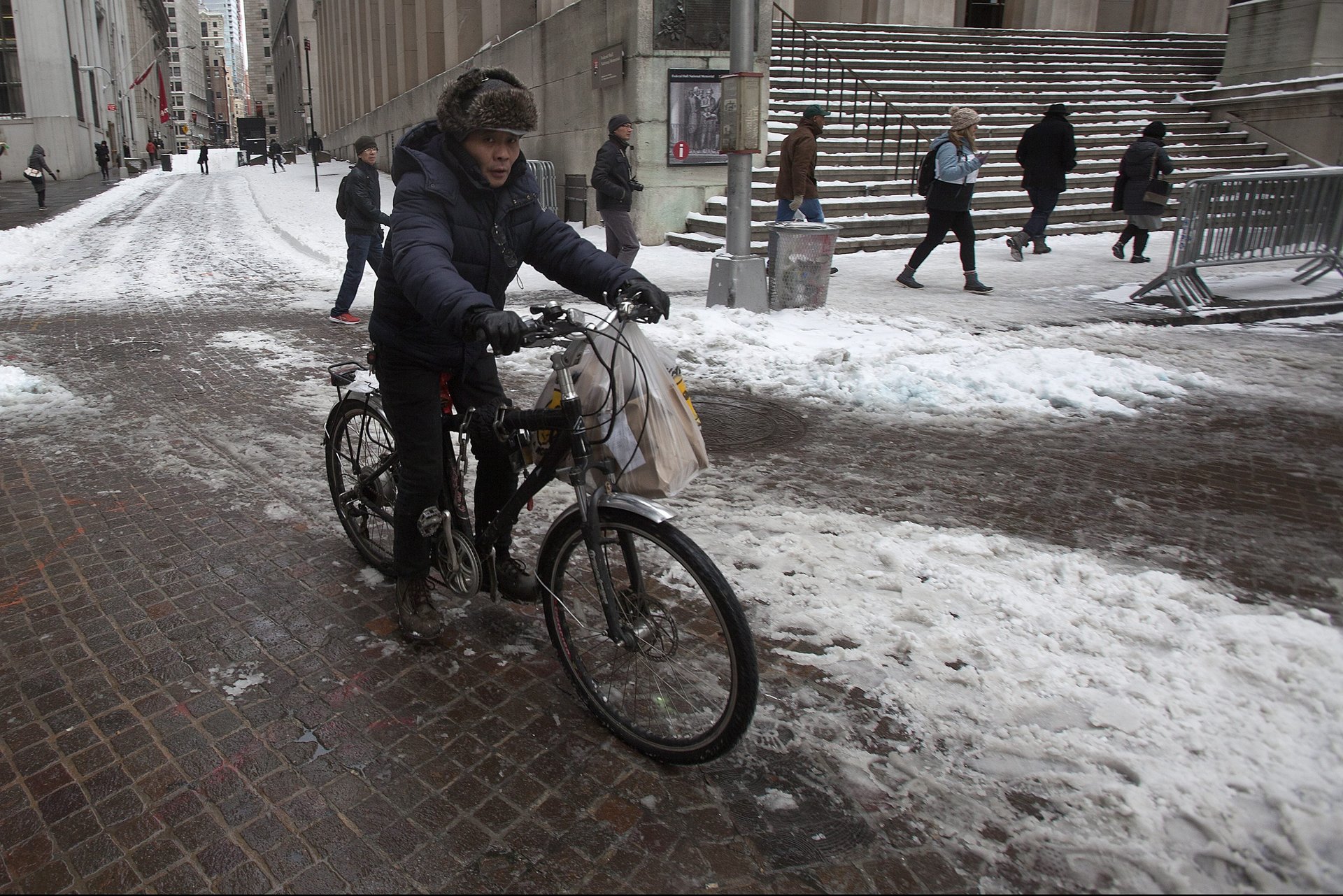Is it unethical to order Seamless in a snowstorm?
When winter storms hit and kitchen cupboards are empty, no one wants to trudge through freezing wind and snow, and plenty of people turn to delivery services for nourishment. Ordering food delivery essentially means paying someone to travel through the cold you’re sheltering from. Looking at the weather outside, it’s hard to ignore the question: Is this unethical?


When winter storms hit and kitchen cupboards are empty, no one wants to trudge through freezing wind and snow, and plenty of people turn to delivery services for nourishment. Ordering food delivery essentially means paying someone to travel through the cold you’re sheltering from. Looking at the weather outside, it’s hard to ignore the question: Is this unethical?
The short answer, surely, is yes. Ordering delivery means paying someone to do something quite unnecessary that you’re unwilling to do yourself. Delivery companies may be up and running, but the bosses making those decisions aren’t the ones cycling through the snow.
People may tip more in a blizzard but typically not that much more, and the extra time it takes to get from one delivery address to the next tends to offset any increase in individual tips. Pressing a button to summon food to you instead of going outside yourself (or stocking up before the storm) seems flagrantly inconsiderate. Two years ago, New York mayor Bill de Blasio expressly asked New Yorkers not to order delivery on a snow day; ethicists would likely agree with him.
Then again, while getting your own food would save delivery employees from traveling through the snow, it would also deny them income—especially as a considerable chunk of their salaries come from tips. The moral conundrum tied up in ordering from Seamless or Postmates or any other service on a snow day also applies to every other time you pay into a system that demands employees perform an unpleasant job.
Buying groceries during a snowstorm is considerably more considerate than ordering delivery, as you aren’t summoning an employee to solve your individual need. But if workers enjoying snow days at home thought others should also be allowed this respite, they would do their grocery shopping in advance and shun companies that forced their workers to journey through treacherous conditions. A perfectly considerate customer base wouldn’t demand every food shop remain open throughout a snow storm. In reality, bosses know customers aren’t so selfless, and so they call employees into work throughout the worst of the weather.
Then there are all the other purchases you make that have nothing to do with snow storms but also support questionable employment practices: The clothes made in unsafe factories, the fast-food chains that refuse to pay a living wage, the apps such as Uber that consider their workers “contractors” and so don’t provide benefits and consistently slash rates.
This isn’t to say ordering Seamless in a snowstorm is ethical, just that it’s no more unethical than the many other purchases that reward unsatisfactory working conditions. Yale psychologist Paul Bloom has written on how empathy is a poor motivator of ethical decisions: In this case, though empathy leads us to think twice over making individuals we can see trudge through the snow, it distracts us from those working in far worse conditions overseas. Ignorance isn’t an excuse, thanks to the many reports of widespread company abuses; we learned in 2016 that Apple employees in Chinese factories were forced to work “excessive and illegal overtime,” for example, but it didn’t slow iPhone purchases.
What’s the solution? Individuals should certainly reconsider their decisions and strive to be ethical consumers. It will likely take a more widespread systemic shift—such as the evolution of robots to do the worst jobs and universal basic income so employees don’t have to rely on tips in a snowstorm—to create real change. In the meantime, if you do order Seamless in a snowstorm, at least give a hefty tip.
Update: This story has been amended to remove out-of-date information about previous weather events.